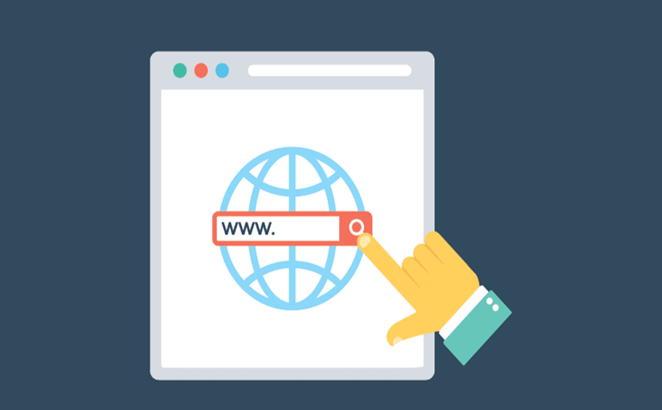The Digital Frontier: Unveiling the Reign of Web Domains
Are web domains more than just addresses on the internet? In "The Digital Frontier: Unveiling the Reign of Web Domains" we delve into the fascinating and often overlooked story behind these seemingly simple strings of characters.
What hidden power do they hold, and how have they shaped the digital landscape?
Join us on a journey to uncover the untold secrets of cheap domains you buy in the UK and their profound influence on our interconnected world.

Navigating the Evolving Domain Name System
The Domain Name System (DNS) has seen a major shift in its function since the internet's early years in the 1990s as it has developed into a dynamic digital world.
The bought cheap domains extensions.com,.edu,.gov,.mil,.org,.net, and.int was used in the past in the UK to identify websites and to indicate the purposes of their owners. In addition, the cheap domains you buy with national codes like.uk and.fr denoted specific geographical areas.
But with over 1500 bought cheap domains in use today in the UK, the internet has become more varied. A problem for corporations is that domains like.com,.net, and.org which were once exclusive are now available to everyone.
Despite these changes often going unnoticed, recent announcements by ICANN suggest more transformations on the horizon.
It is crucial to reflect on this journey and consider the future of the service used by over 5 billion individuals. If you are looking to buy a cheap domain in the UK, it's important to understand how these shifts could impact your online presence and strategy.
With the domain landscape constantly evolving, securing the right domain name is essential for establishing your digital identity in the competitive online sphere.
Whether you're a business owner, entrepreneur, or a passionate individual, the strategic acquisition of a suitable domain can significantly influence your online success in the UK.
What Led Us to This Point?

Prior to the 1990s, academic researchers were the main users of the internet, which was then known as ARPANET.
The Advanced Research Projects Agency (ARPA) of the U.S. Department of Defense created the Internet in order to promote cooperation between universities and governmental organizations.
Its revolutionary impact resulted from the creation of standardized protocols such as TCP/IP, which paved the way for the digital revolution that has since profoundly altered contemporary society.
In those early years, two scholars from the University of California at Los Angeles, John Postel and Joyce K. Reynolds, established an administrative body to oversee the technical aspects of the burgeoning network.
However, the Internet remained largely within the academic realm, functioning as a collaborative effort across various universities to uphold its infrastructure.
The increasing availability of the Internet during the 1990s led to a drive for government control and commercialization.
In 1993, the U.S. government agency National Science Foundation privatized the domain name registry, opening the door for people buying generic cheap domain names in 1995.
Users were unhappy about this change since it consolidated control over what was originally intended to be a decentralized system, with various nations establishing their own laws governing the use and sale of unique country codes.
In response, Postel proposed the establishment of new top-level domains, seeking to institutionalize his organization.
When this suggestion went unheeded, Postel directed eight regional root system operators to switch their central servers to his organization's, triggering a tug-of-war for control over internet naming between Postel and the government.
After a contentious backlash from government officials, Postel reversed his decision.
Subsequent changes were made to the authority over these root system servers, and shortly afterward, Postel unexpectedly passed away.
His organization was then assimilated into the newly formed ICANN, tasked with assuming the functions of Postel's entity. As the internet's reach expanded globally, the surge in commercial interest prompted a proliferation of domain names.
In 2005, new domain names such as.mobi for mobile internet access and.asia to meet the growing internet usage in the Asia-Pacific region were launched in response to the changing nature of internet usage.
Notably, big organizations realized the potential of these distinctive character sequences, which prompted ICANN to permit companies to submit applications for their own domains in 2012.
As of right now, 496 businesses own these exclusive domain names, such as.bmw for the massive automaker and.sky for the telecom company.
The ICANN recently revealed plans for a second round of brand name issuance that is slated to take place in 2026, providing more chances for companies to claim their virtual real estate.
In a way, Postel's vision of a decentralized internet materialized in 2016 when ICANN concluded its contract with the U.S. government and transitioned its operations to the global internet community.
Where Is This All Headed?
While it remains challenging to foresee the precise future applications of the internet and the potential structural shifts necessary for adaptation, intriguing technological advancements could pave the way for transformation.
The surge in blockchain technologies, catalyzed by the soaring utilization of cryptocurrencies, may lead to further decentralization in terms of system ownership.
In contrast to the traditional method of registering cheap domain names in the UK via a centralized body made up of multiple international stakeholders, blockchain technology can be used to equally divide ownership among all users.
This development could have intriguing democratic ramifications for protecting areas of the internet.
Conversely, the progress in metaverse technologies may introduce a fresh perspective on domain registration.
As the boundaries between digital technologies and physical reality continue to blur, this evolution could involve asserting control over digital space layered atop physical landscapes or claiming ownership over a simulated realm within a virtual reality universe.
If you are looking to buy cheap domains in the UK, understanding these potential shifts and advancements in technology could provide valuable insights for making informed decisions and staying ahead in the digital landscape.
Anticipating an Exciting Tomorrow
Whatever the changes that lie ahead, a historical perspective indicates that we are moving towards a future in which the possibilities for online interaction are continuously expanded and rethought.
Technology has come a long way from its beginnings as a tool for scholarly research to become an essential part of people's daily lives.
As these developments take shape, they will produce new benefits that will promote connectivity, entertainment, and information accessibility in ways that will have a big impact on everyone's life.
Amidst this progress, the opportunity to buy affordable UK domains remains a pivotal asset, contributing to an inclusive and dynamic digital landscape, enriching accessibility, and fostering connectivity for all.
19 Jan 2024
 GBP (£)
GBP (£)
 USD ($)
USD ($)







